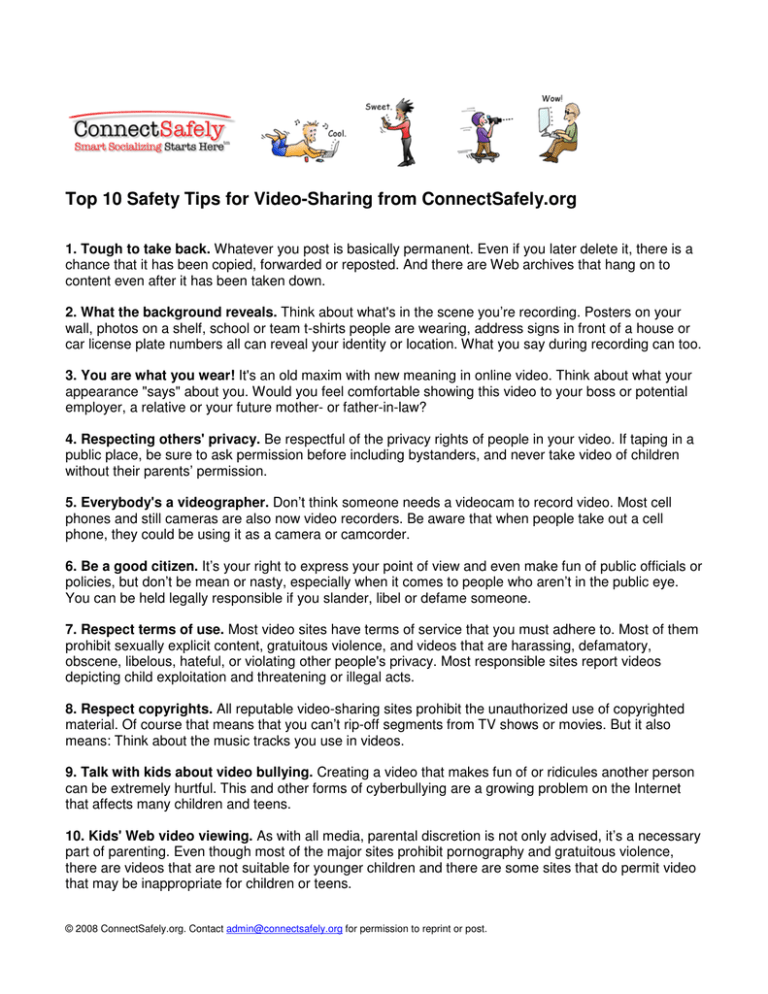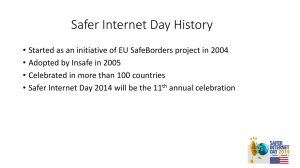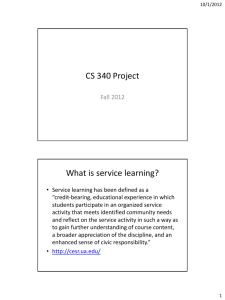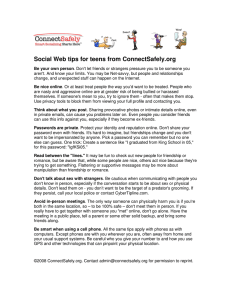Top 10 Safety Tips for Video-Sharing from ConnectSafely.org
advertisement

Top 10 Safety Tips for Video-Sharing from ConnectSafely.org 1. Tough to take back. Whatever you post is basically permanent. Even if you later delete it, there is a chance that it has been copied, forwarded or reposted. And there are Web archives that hang on to content even after it has been taken down. 2. What the background reveals. Think about what's in the scene you’re recording. Posters on your wall, photos on a shelf, school or team t-shirts people are wearing, address signs in front of a house or car license plate numbers all can reveal your identity or location. What you say during recording can too. 3. You are what you wear! It's an old maxim with new meaning in online video. Think about what your appearance "says" about you. Would you feel comfortable showing this video to your boss or potential employer, a relative or your future mother- or father-in-law? 4. Respecting others' privacy. Be respectful of the privacy rights of people in your video. If taping in a public place, be sure to ask permission before including bystanders, and never take video of children without their parents’ permission. 5. Everybody's a videographer. Don’t think someone needs a videocam to record video. Most cell phones and still cameras are also now video recorders. Be aware that when people take out a cell phone, they could be using it as a camera or camcorder. 6. Be a good citizen. It’s your right to express your point of view and even make fun of public officials or policies, but don’t be mean or nasty, especially when it comes to people who aren’t in the public eye. You can be held legally responsible if you slander, libel or defame someone. 7. Respect terms of use. Most video sites have terms of service that you must adhere to. Most of them prohibit sexually explicit content, gratuitous violence, and videos that are harassing, defamatory, obscene, libelous, hateful, or violating other people's privacy. Most responsible sites report videos depicting child exploitation and threatening or illegal acts. 8. Respect copyrights. All reputable video-sharing sites prohibit the unauthorized use of copyrighted material. Of course that means that you can’t rip-off segments from TV shows or movies. But it also means: Think about the music tracks you use in videos. 9. Talk with kids about video bullying. Creating a video that makes fun of or ridicules another person can be extremely hurtful. This and other forms of cyberbullying are a growing problem on the Internet that affects many children and teens. 10. Kids' Web video viewing. As with all media, parental discretion is not only advised, it’s a necessary part of parenting. Even though most of the major sites prohibit pornography and gratuitous violence, there are videos that are not suitable for younger children and there are some sites that do permit video that may be inappropriate for children or teens. © 2008 ConnectSafely.org. Contact admin@connectsafely.org for permission to reprint or post.



